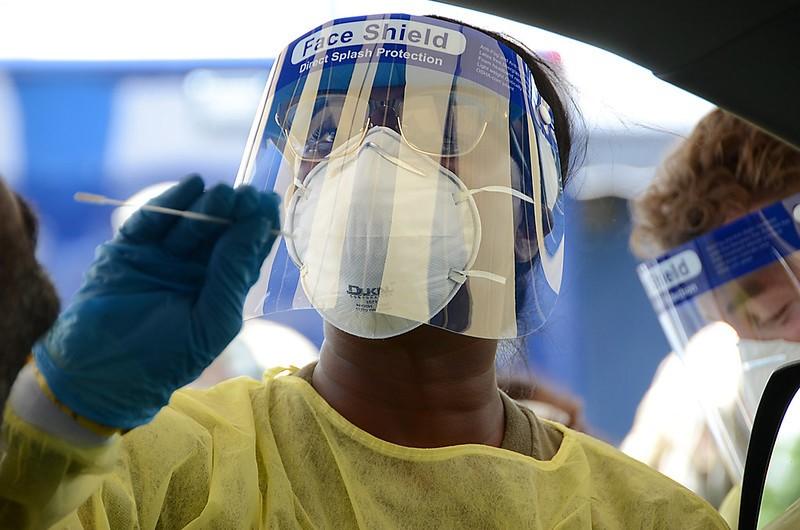After a 6-week decline, global COVID-19 cases are on the rise again, a concerning development balanced against the backdrop of promising vaccine launches in Ghana and Ivory Coast, the first nations to receive their COVAX doses.
Multiple factors could be fueling new rise
At a World Health Organization (WHO) media briefing today, Director-General Tedros Adhanom Ghebreyesus, PhD, said even as immunization gains traction, vaccines alone won't keep people safe. Globally, cases have increased for the first time in 7 weeks, with infection on the rise in four of the WHO's six regions. They include the Americas, Europe, South East Asia, and the Eastern Mediterranean.
"This is disappointing, but not surprising," he said, adding that officials are working to better understand the increased transmission, which Tedros said may partly reflect relaxing of public health measures, circulation of variant viruses, and people letting down their guard. "Vaccines will help to save lives, but if countries rely solely on vaccines, they’re making a mistake," he said.
US officials last week warned that prevalence of the more transmissible B117 variant is rising, putting the nation at risk for a fourth spike.
A number of European countries took new steps to curb their quickly rising cases, according to media reports. For example, Norway said it will tighten a lockdown in Oslo, which is experiencing a steep rise in cases linked to the B117 variant. And Finland, also grappling with a fresh surge, today announced a state of emergency and a 3-week lockdown that will start on Mar 8.
In eastern Europe, Hungary is experiencing an exponential rise in cases and announced today that it will adjust its vaccination plans to give as many people as possible their first dose by extending the period between the two doses. Slovakia, also experiencing a resurgence, announced new measures to begin on Mar 3, which will include movement restrictions and more proactive respirator use for people in shops or on public transportation.
First COVAX vaccine campaigns launch in Africa
At today's WHO briefing, Tedros said health workers in Ghana and Ivory Coast today started receiving vaccine supplied through COVAX, the program led by the WHO and its partners to support vaccine development and ensure equitable access to vaccine doses. Last week, the countries received shipments of AstraZeneca-Oxford COVID-19 vaccine produced at India's Serum Institute. The WHO's partners include the Coalition for Epidemic Preparedness Innovations (CEPI), Gavi, the Vaccine Alliance, and UNICEF.
"It's encouraging to see health workers in lower-income countries starting to be vaccinated, but it’s regrettable that this comes almost 3 months after some of the wealthiest countries started their vaccination campaigns," he said, noting that some countries are already vaccinating younger, healthier adults while health workers and older adults in other parts of the world wait for their doses.
"We're not asking countries to put their own people at risk," he said. "We’re asking all countries to be part of a global effort to suppress the virus everywhere."
In a statement, the WHO and its partners said Ghana has 600,000 doses, and Ivory Coast has 504,000, with the countries to receive 11 million more this week. The 142 countries that are part of COVAX will receive 237 million doses by the end of May.
At today's briefing, Tedros said COVAX will publish the first round of country allocations tomorrow.
Mariangela Simao, MD, MSc, the WHO's assistant director-general for access to medicines and health products, said countries must complete certain steps before receiving their shipments, including a preparedness plan, regulatory approval, and an indemnification agreement.
Other global headlines
- In New Zealand, the city of Auckland entered another lockdown for the fourth time, slated to last 7 days, following the detection of another local COVID-19 case, according to Reuters. An additional two cases were reported over the weekend, and the city's mayor has asked the country to prioritize Auckland residents for vaccination.
- Somalia is among the countries reporting a steep rise in cases, and the country's health minister today proposed new measures, which include closing all schools, imposing distancing measures, and prohibiting large gatherings, according to the New York Times.
- A survey from the global communications company Kekst CNC on attitudes toward vaccination and other COVID-19 issues found that as vaccination begins, higher numbers of people in all countries say they would be immunized, reaching nearly 90% in the United Kingdom. All countries except the UK say the vaccine rollout is too slow, and in Europe, many blame the European Union for speed bumps in vaccine rollout.






















